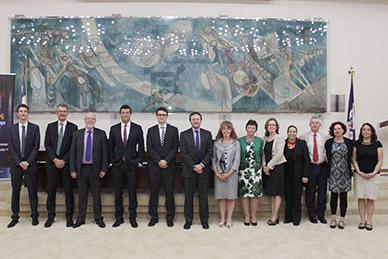- Representatives of renowned universities showed themselves very interested in establishing agreements and exchange programs in fields like nanoscience, food technology, didactics of mathematics and Latin American studies, among others.
On Monday 17th, our University was visited by representatives of thirteen renowned British universities that showed their deep interest in creating academic links and establishing mutual collaboration agreements.
Particularly, the most attractive fields for the European universities were research in mathematics or in Latin American studies, nanoscience, food technology, technology transfer and English language practice. In these areas, significant collaboration opportunities were open in the short and the medium term.
Óscar Bustos, Vice President of Research, Development and Innovation of Universidad de Santiago, who also took part in the meeting with the British academics and academics from our university, said that this meeting “allows us to have great expectations with respect to potential studies conducted together with some of the most prominent universities of the United Kingdom.”
“The importance of this visit lies in the experience and international recognition of the participating institutions. Universities like Edinburgh or Sheffield are well positioned in world rankings and the work they do is in agreement with our own lines of research,” he added.
According to Vice President Bustos, the fact that our University is recognized for its research work “is one of the factors that attracted the British delegation.”
“Nowadays, our University is in the fourth place in the national rankings of research productivity, publications and awarded projects. These developments, in all areas of knowledge, must have persuaded these British institutions into coming to Universidad de Santiago and proposing academic exchange programs, collaborative works and research,” he concluded.
For her part, Carol Johnson, Head of the Department of International and Inter-University Relations of our University said that the British academics had “excellent” references of Universidad de Santiago “and they knew that we are a complete and complex institution that is well positioned in international rankings; therefore, their visit was not by chance: it is the result of our prestige as university.”
According to Carol Johnson, this first meeting is consistent with Universidad de Santiago’s internationalization policy that has the goal -among others- of establishing links with the best institutions in the world.
“This contact was very promising. It will open many doors to our students and academics, and also, it allows us to put in practice our ambitious internationalization policy,” she added.
At the meeting, that was held at the Rectoría building, Óscar Bustos, Vice President of Research, Development and Innovation; Carol Johnson, Head of the Department of International and Inter-University Relations; Rafael Labarca, Dean of the Faculty of Science; Jaime Eugenín, Vice Dean for Research and Graduate Programs of the Faculty of Chemistry and Biology; Francisco Castañeda, professor at the Faculty of Administration and Economics; Fernando Estenssoro, professor at IDEA; Gastón Herrera, professor at the School of Architecture and Roxana Orrego, professor at the Department of Linguistics and Literature, were present.
The authorities and academics of the following thirteen universities were present at the meeting: University of Ulster, Durham University, University of Sheffield, University of Edinburgh, University of Warwick, University of Bath, Bristol University, Middlesex University, University of Kent, Northumbria University, Glasgow Caledonian University, Cranfield University and University of South Wales.
Translated by Marcela Contreras



